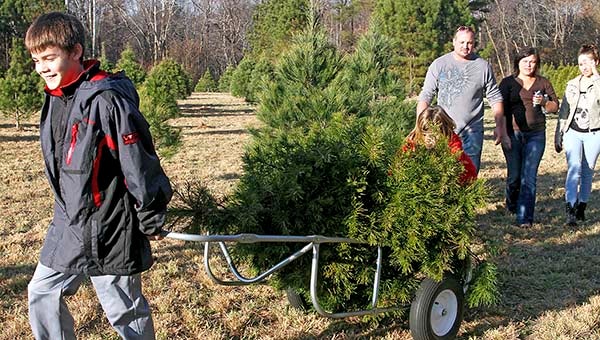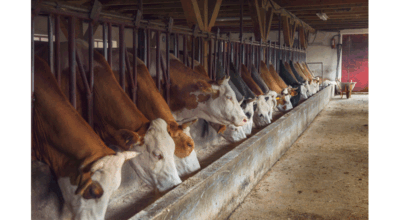Zuni farm cultivates a holiday tradition
Published 11:07 am Wednesday, December 4, 2013

Baron, 11, and Gracie-Mae Young, 8, haul back the family’s Christmas tree. Following, from left to right, dad Derrick Deschamps, mother Holly Young and sister Kourtney Rouse, 18. — CAIN MADDEN | TIDEWATER NEWS
ZUNI—Picking out and cutting a fresh tree for Christmas is a family tradition for Holly Young of Windsor. She and her family were at the Zuni Tree and Alpaca Farm on Monday afternoon to continue that custom for the 13th year.

Johnnie Carr, of Courtland, trims the Fraser Fir cut offs so that Zuni Tree and Alpaca Farm owner Shirley Nelson can make wreaths. — Cain Madden | Tidewater News
“I want one that’s fat and smelly,” her daughter Gracie-Mae, 8, said to everyone.
Off they went along with her brother Baron, 11, sister Kourtney Rouse and dad Derrick Deschamps to search the selections that Shirley and Ron Nelson offer at their business.
“We sold over 147 trees this past weekend,” said Shirley. “It was busy.”
And there are plenty more from which to choose this holiday season: Eastern White Pine, Virginia Pine, Scotch Pine, Norway Spruce, Canaan Fir, Fraser Fir, Eastern cedars, Burkii cedars, Incense cedars, Murray cypress, Naylors Blue cypress and Silver Dust cypress. Sorry, but the few Blue Ice and Carolina Sapphires are already sold out.
“People ask for the fresh-cut Fraser trees, Eastern White Pine and Murray Cypress,” Shirley observed. “Norway and Canaans we don’t plant that often. They can take up to 10 years [to mature].”
The Nelsons have operated the farm since 2000. She said they first bought only 27 acres in 1999 from the previous owner, who also had operated it as a tree farm.
“We lived in Virginia Beach for 25 years, and my husband decided he wanted a piece of property,” said Shirley, adding that a friend recommended the place they are now and “maybe we should check it out.”
As for cultivating Christmas trees or alpacas, the couple admittedly didn’t have a clue about either one.
“Nothing,” Shirley said to describe their qualifications. Their previous careers were at the Norfolk Naval Shipyard.
“We called up the Virginia Christmas Tree Growers Association, and John Carroll of the Department of Forestry showed us what to do,” she explained.
The Nelsons also belong to the National Christmas Tree Growers Association, as well as the state one.
Among many lessons, the Nelsons discovered there is a science to shearing the trees, which along with keeping fields clean of debris and pests, is a year-round chore. Shirley can use a long knife for the work, which also helps to give Christmas trees their desired shape.
For example, cedars shouldn’t go beyond 12 inches in a season’s time. If left to grow unchecked, there can be too many bare spots later on, she said. Further, cuts are made at 45-degree angles and allow for new buds and growth the following year. Average heights range from 5 to 6 feet, and 7 to 8 feet. A few, such as Virginia Pine, can grow up close to 13 feet tall. This year they also had a few 9 to 10-feet-tall trees.
As you would expect, the Nelsons are as vulnerable to the weather as every other farmer. They remember all too well the drought of 2007 and, even worse, 2010. The heat and dryness cost them 1,300 seedlings alone that second time.
Five years into the business, the Nelsons sold their place in Virginia Beach and moved to Zuni permanently.
On the farm is a small shed, heated for customers’ comfort, which offers fresh wreaths made daily. Bows, cones and, of course, alpaca products such as feather-soft gloves, hats and scarves are also sold.
“We bought our first two alpacas, two gelded males, and then two more,” Shirley said. Bandit Amadeus is the name for one male because he’s often been caught stealing milk from another female and also because of a black muzzle.
“After 10 years, we got our first female for breeding,” she added.
There are three alpacas on the farm and nine housed at Courthouse Pastures on Route 258. The Nelsons plan to expand their operation next year and bring the others home.
Their fleece is sold to a cooperative and turned into the aforementioned products, for which the farm gets credit and can sell. Some of the socks, for example, are made only in the United States, but there are also items that come from Peru.
Most of the time, Shirley is involved with the trees, but she has ambitions to do more with the fleece, and has even bought a carder for processing.
“Eventually I want to work some of the fiber myself, such as making clothing, felting for toys or hats and even upholstery fabric,” she said.
About 15 to 20 minutes later, the family returned with Baron pushing the cart that contained the full and fragrant Virginia Pine they all agreed on.
Johnnie Carr, who works seasonally for the Nelsons, lifted the tree into a machine that shook it enough to disperse any loose needles or other unwanted growth, such as nests of praying mantises that can attach to branches. Then Carr lifted the cleaned tree into a cone-like object that wrapped netting before helping secure it onto the car roof.
He or the Nelsons are naturally also available to help anyone select the kind of tree they want. Carts and bow saws are on hand for customers who want to do the cutting, or the staff can help.
“It ain’t Christmas without a real tree,” said Holly.
“The best thing is that you can come out with your family,” said Derrick.
The farm is located at 19362 Tomlin Hill Drive in Zuni, and is open noon to 5 p.m. Monday through Friday, and 9 a.m. to 5 p.m. Saturday and Sunday.
Cash and credit cards only are accepted.
For more information, call 242-4780 or 758-0874; email zunitree@gmail.com; or visit www.zunitreealpacafarm.com.





